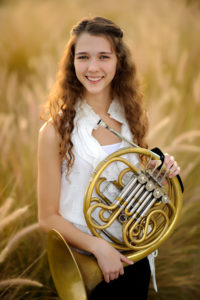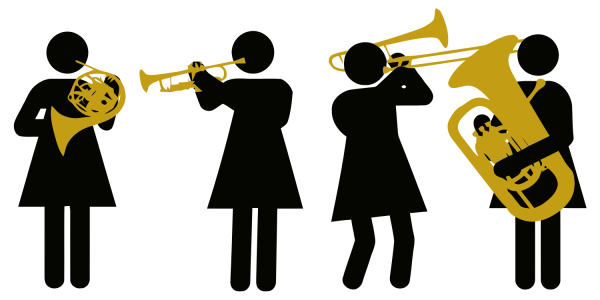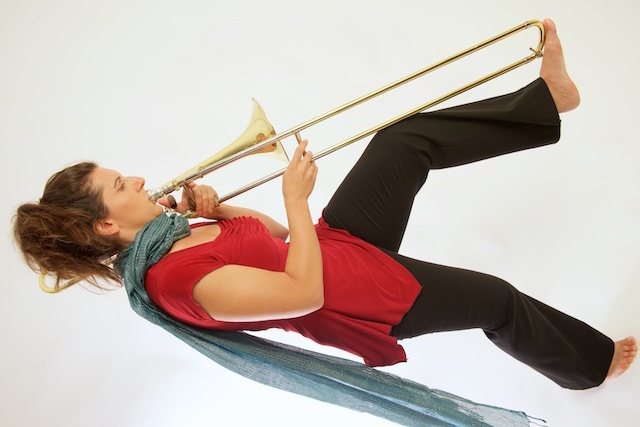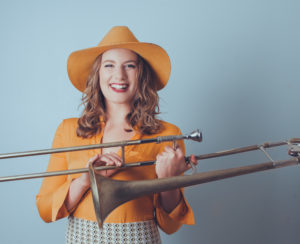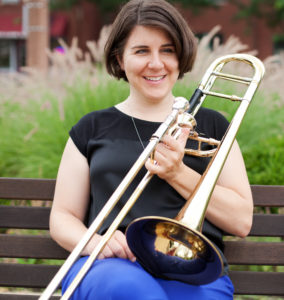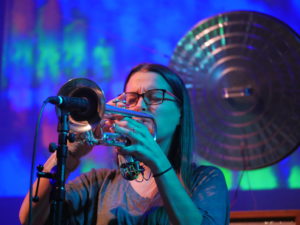 Sarah Belle Reid is a Canadian performer-composer, active in the fields of electroacoustic trumpet performance, intermedia arts, music technology, and improvisation. She is a co-developer of the Minimally Invasive Gesture Sensing Interface (MIGSI) for trumpet: an open-source, wireless interface that captures performance data and provides real-time extended sonic and visual control for improvisation. Reid has presented and performed with MIGSI at institutions and festivals around the world including Stanford University’s Center for Computer Research in Music and Acoustics (CCRMA), the International Conference of New Interfaces for Musical Expression (NIME 2015: Brisbane, Australia), New Media Art & Sound Summit (NMASS 2017: Austin, TX), University of Oregon, UT Austin, and UC Irvine’s Women in Music Technology Symposium (2016), among others. Reid received a Bachelor of Music in trumpet performance from McGill University’s Schulich School of Music and a Master of Fine Arts from the California Institute of the Arts, where she is currently on faculty teaching music technology (Music Technology: Interaction, Intelligence, and Design), and music theory.
Sarah Belle Reid is a Canadian performer-composer, active in the fields of electroacoustic trumpet performance, intermedia arts, music technology, and improvisation. She is a co-developer of the Minimally Invasive Gesture Sensing Interface (MIGSI) for trumpet: an open-source, wireless interface that captures performance data and provides real-time extended sonic and visual control for improvisation. Reid has presented and performed with MIGSI at institutions and festivals around the world including Stanford University’s Center for Computer Research in Music and Acoustics (CCRMA), the International Conference of New Interfaces for Musical Expression (NIME 2015: Brisbane, Australia), New Media Art & Sound Summit (NMASS 2017: Austin, TX), University of Oregon, UT Austin, and UC Irvine’s Women in Music Technology Symposium (2016), among others. Reid received a Bachelor of Music in trumpet performance from McGill University’s Schulich School of Music and a Master of Fine Arts from the California Institute of the Arts, where she is currently on faculty teaching music technology (Music Technology: Interaction, Intelligence, and Design), and music theory.
1.You have so many interesting projects, from composing, interactive media works, teaching, and your own performing. How do you keep track of everything and decide where to focus your attention?
I’m the type of person who always has a lot of different projects on the go. Over the last 6 years or so my practice has evolved from being exclusively focused on the trumpet to something that is much more interdisciplinary in nature: working with technology, incorporating different media, and exploring ways of presenting and interacting with sound-based performance that fall beyond a typical recital hall or concert setting. I find that working this way—merging music and sound art with electrical engineering, computer programming, and some elements of theatre or performance art—truly enriches my creative output and feels most genuinely like me.
I guess what I’m saying is that I always have a lot of projects on the go because I am constantly inspired by things I don’t fully understand. That leads me to study and learn about something new, which then inspires me to create something with those new tools or skills. And from there it’s a very fortunate snowball effect—if you’re open to new directions and collaborations, you’ll always be busy!
Of course, there’s always a balance that needs to be struck, as time and energy are limited resources. One on hand, learning new skills and tools can enrich your creative practice and open new doors, but on the other hand, it’s necessary to focus your practice in order to develop your craft. The way I try to handle this is by checking in regularly on my priorities and goals as an artist (and as a human). Is this project really fulfilling to me? Is it distracting from other goals I have? It’s important to ask yourself these questions and to really try to trust yourself. What makes you happy? This is a very different question from, “What do others think I should be doing?”
Beyond this, I make a lot of to-do lists, and schedule my time meticulously. I’ve learned that if I don’t protect my practice time and studio time, it’ll get buried beneath a hundred other obligations, so I carve out time in my calendar every morning to make sure it happens. One approach that has been particularly helpful to me over the past year is time blocking. This is where you block out time in your calendar for particular areas of focus, rather than specific tasks (e.g. you might block out an hour each day to business-type tasks such as answering emails or updating your website, or you might block out a few hours each Saturday to dedicate to composing.) Then, separate from these time blocks, you maintain a detailed list of all the individual tasks that fall into these categories and you pull one out at a time to focus on for that time block. This approach helps me stay focused and know that I’m constantly taking small but steady steps toward my goals.
2. How did you get started writing music for yourself and others? Do you have anything coming up in the near future?
I started writing music for myself and others around the same time I started to get interested in working with technology. At the beginning, I felt intimidated by the word ‘Composer’ because I had no formal compositional training, and a lot of the work I was creating used systems, instruments, or modes of interaction that didn’t really fit into traditional Western notation. I resisted calling myself a composer for a couple of years (even though I was regularly creating work for myself and others to perform) because I felt like people wouldn’t take me seriously. I eventually decided that I wanted the same opportunities as people who called themselves ‘composers’ and wasn’t going to let a silly word get in the way of my goals. Sometimes you just have to jump in!
One of the first large works I created after this point was called Disonillum. The piece is a multimedia installation inspired by memory imprints, which incorporated hand-drawn graphic scores printed onto three-dimensional acrylic objects. The performance of the work took place over the course of a week, with one performer entering the space to interpret the scores each day. As they played, their sound was recorded and sent into a long term degenerative audio process. One by one the performances would be added into the room, layering on top of each other and gradually degrading until almost unrecognizable.
I recently premiered a new concert-length work for augmented trumpet, modular synthesizer, and large metal objects called Timepiece. The metal objects are suspended throughout the performance space and are each outfitted with a contact microphone and surface transducer, transfo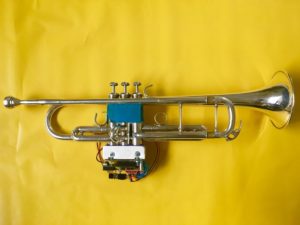 rming them into resonant feedback instruments. The trumpet I play has a custom hardware interface called MIGSI attached to it that I have been developing for the last few years. Using a number of different sensors, MIGSI captures gestural information from me and my trumpet as I play, and sends that data to a computer as control information. In Timepiece, data collected from MIGSI is used to control and interact with a Serge modular synthesizer.
rming them into resonant feedback instruments. The trumpet I play has a custom hardware interface called MIGSI attached to it that I have been developing for the last few years. Using a number of different sensors, MIGSI captures gestural information from me and my trumpet as I play, and sends that data to a computer as control information. In Timepiece, data collected from MIGSI is used to control and interact with a Serge modular synthesizer.
The next performance I have coming up is a 45-minute solo set on trumpet with MIGSI as part of Moogfest (in Durham, North Carolina) on May 17th. I’ll also be leading two workshops on building interactive systems and performing with electronics throughout the weekend.
3. Tell us about your work on Patreon. How does that influence your process in terms of output of music, posting on social media, and more? Why did you decide to move to this platform and what do you hope to achieve from it?
Patreon is an online membership platform that makes it possible for people to support their favorite artists and creators. It’s a lot like a subscription to Netflix or a magazine: for example, if you like my music and the work I’m creating, you can become a patron by making a monthly pledge of $1 or more. In return, you can receive exclusive content, early access to releases, behind the scenes footage, mentorship, or other perks like free downloads and discounts. For independent artists such as myself, this platform makes it possible to grow and connect with your audience in a really meaningful way that might not otherwise be possible.
About a year ago I launched a patron-only collaborative project called The Postcard Project, in which I compose graphic scores on the backs of postcards and mail them to my patrons all around the world. They perform the piece in whatever way makes sense to them, and then create their own graphic score for me and mail it back, which I perform, and so on. It has been inspiring to see this project grow to over 20 collaborators spanning multiple countries, with more continuing to join in!
Even though my Patreon community is still relatively young, the motivation and support I have received from my patrons has been life changing. The monthly pledges I receive make it possible for new projects to come together (such as Timepiece and recent MIGSI developments) that would otherwise never be possible without external funding. It also means I can focus more time and energy on actually creating work and less on project-specific fundraising, pushing merch sales, and so on. I’ve been more productive than ever this past year and a lot of that has to do with the fact that I feel like I have a cheering squad behind me every single day!
4. Do you think we have a specific role or responsibility as female brass players? How do you incorporate that (or not) into your own life as a musician?
As a woman who plays trumpet and works with technology, I am regularly at the receiving end of comments that downplay my accomplishments or question my expertise. Many of these come from more or less well-intentioned audience members who don’t realize that comments about someone’s body (“how can such a small girl produce so much air?”); gender (“I never knew a woman could make noise music”); or technical ability (my personal favorite: “who coded/built/set all of this up for you?”) are draining, offensive, and damaging to self-confidence. Unfortunately these biases exist within our community as well. I was recently hired to play in an all-women band for a high-profile artist. Upon sharing the exciting news, I was told by a male colleague that it could have been a success for my career, had there been men in the band too—as though the presence of men would somehow legitimize the job and my position within it.
I know I’m not alone in facing these types of issues, and regrettably, I see many of my students grappling with very similar challenges. While we have certainly have made progress toward equality in this field, there is yet work to be done. As an artist and teacher, one of my main goals is to create a space where students feel excited and empowered to explore new things, whether that’s learning new repertoire, programs, tools, or creative interests. I think it’s important to recognize that we all have the capacity to be role models for the next generation of musicians and creators. We all have the capacity to promote confidence, hard work, and self worth in our students, and to foster an educational environment that is rigorous while being supportive and inclusive.
5. Is there anything you wished you had known as a student or young professional that you know now? Any advice that you’d like to share with younger female musicians?
I think one of the most important insights I’ve gained over the years is that it’s okay to be different (in fact, it’s good to be different). I struggled as a student because although I loved playing the trumpet, I felt disconnected from the repertoire I was studying. At the time I didn’t feel confident enough to admit that I didn’t love every aspect of what I was studying, so I pushed myself to keep going. I didn’t recognize this at the time, but I became unnecessarily stifled and nervous as a result. My performance suffered as a result, and my progress on the instrument plateaued. But when I started to improvise, build my own instruments, and integrate elements of theatre into my work, I immediately felt as though I had found my voice as an artist. I remember the first time I stood in front of an audience performing a work that truly spoke to me. I had been playing trumpet for my whole life, but it felt like my first honest performance—I never looked back.
At the end of the day, here’s the most important point: Find that thing that makes you feel utterly and completely fulfilled, and own it. Don’t let anyone tell you it’s not important, not marketable, not serious enough, or any of that nonsense. Just be you. It takes a huge amount of work, dedication, and perseverance, but if you’re focused and inspired, you can do it. People will notice your passion, and they’ll listen.
6. Any resources you recommend? Books, podcasts, recordings that changed your life, etc?
I learned about time blocking from Suz at Rock/Star Advocate, who is a wonderful resource for musical entrepreneurs and freelancers.
For anyone who’s interested in getting into technology:
